In conversation with Sandeep Dutt, Kalinga Literary Festival
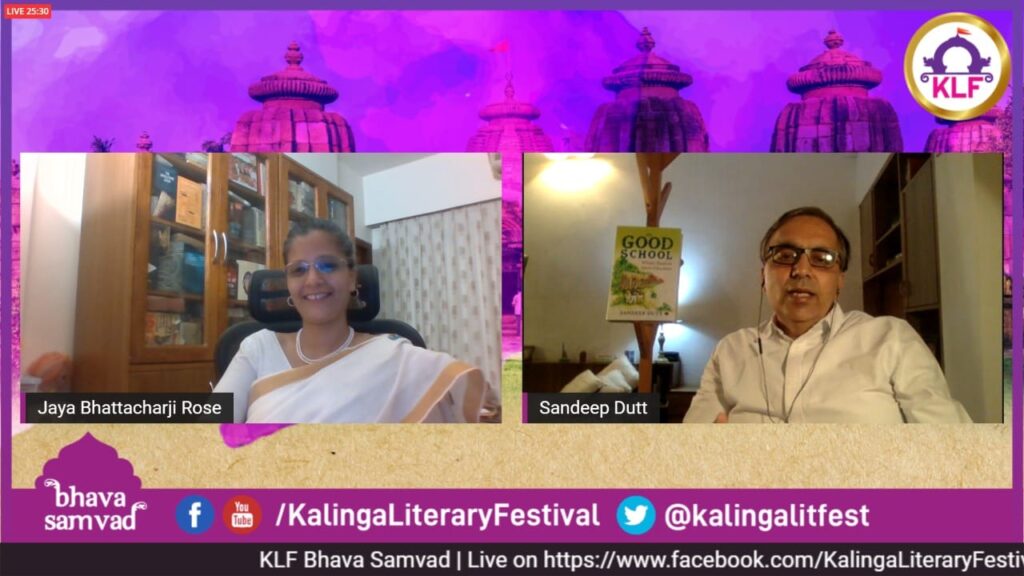
Here is the link to the recording:
20 March 2021

Here is the link to the recording:
20 March 2021
At Jaipur Literature Festival 2019, I was in conversation with author Daman Singh about her novel Kitty’s War at Jaipur Literature Festival 2019. It is historical fiction set within a railway colony at the time of World War II. It is about the Anglo-Indian community told through the eyes and experiences of Katherine Riddle or Kitty, as she is more popularly referred to.
5 Feb 2019
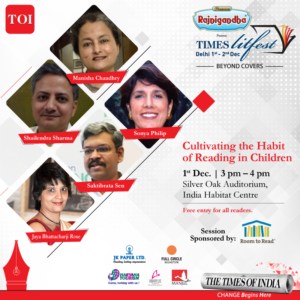 The Times LitFest Delhi ( 1-2 Dec 2018) was organised at the India Habitat Centre, New Delhi. I moderated two sessions with the both panel discussions focussed on reading. The first panel was on how do cultivate the love of reading amongst children.
The Times LitFest Delhi ( 1-2 Dec 2018) was organised at the India Habitat Centre, New Delhi. I moderated two sessions with the both panel discussions focussed on reading. The first panel was on how do cultivate the love of reading amongst children.
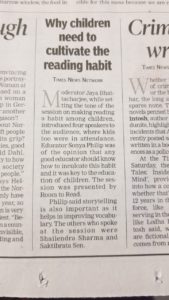
TOI, 2 Dec 2018
My co-panelists were Saktibrata Sen, Programme Director, Room to Read India Trust; Manisha Chaudhry, co-founder Manan Books; Sonya Philips, Founder, Learning Matters Foundation and is a reading specialist and Shailendra Sharma, Principal Advisor (Hon) to the Director Education, Government of NCT Delhi, India. The freewheeling conversation was on ways to promote reading. Every panelist spoke about their strengths and initiatives. From being a part of the government as is Mr Sharma and realising that it is critical to have a reading corner in every class and every section. So much so that the Delhi government has now allocated a handsome budget of Rs 10,000 / section to buy books.
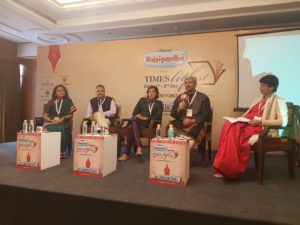
L-R: Manisha Chaudhry, Shailendra Sharma, Sonya Philips, Saktibrata Sen and Jaya Bhattacharji Rose
Fact is that even today few families can afford to buy newspapers, magazines, let alone books. So the first time many children particularly in the government primary schools hold a book is their school textbook. Few have any role models in the adults and older children in their immediate environment and as Principal Advisor to the government, Mr Sharma’s job is to introduce the love of reading. Both Mr Sharma and Mr Sen were of the view that reading is a lifeskill that is critical and needs to be learned beyond just being able to identify your name in whatever written script the individual is familiar with. Mr Sen, representing Room to Read, is involved in setting up partnerships with the governments to set up libraries. In India the Room to Read India Trust is working with 11 state governments. Ms Philips stressed on how till Grade 2 a child learns “how to read” but after that the emphasis is on “learning to read”. Ms Chaudhury with her many years of experience in publishing, looking at multilingual publishing and the critical need for children to have books in their own languages rather than only in English is what spurs her on to create new material every single day. She has recently launched two new magazines in Hindi called Mithvan and Chahak, the latter is meant for the early grade reader.
Everyone was of the agreement that it is important to create the joy of reading and align it as closely as possible to the child’s lived experience rather than alienate him/her from using complicated language in the written word. This was illustrated beautifully by an anecdote Mr Sharma shared about the complicated language used in a Hindi textbook to describe food which was a far cry from what is commonly used at home on a daily basis. Manisha Chaudhry spoke of her earlier initiatives to publish in tribal languages.
Alas we ran short of time otherwise it was promising to become a wonderful conversation on how to cultivate the joy of reading in children.
Join Sonya Philip, Manisha Chaudhury, Shailendra Sharma and Jaya Bhattacharji Rose in conversation with Saktibrata Sen – brought to you by Room to Read in the session, 'Cultivating the Habit of Reading in Children' at #TLFDelhi
Posted by Times Lit Fest – Delhi on Saturday, December 1, 2018
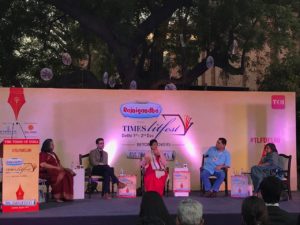
L-R: Ranjana Sengupta, Parth Mehrotra, Jaya Bhattacharji Rose, Udayan Mitra and Himanjali Sankar.
The second panel discussion was on “What is India reading?”. The panelists consisted of commissioning editors of four prominent publishing houses — Himanjali Sankar, Simon & Schuster India; Ranjana Sengupta, Penguin Random House India; Parth Mehrotra, Juggernaut and Udayan Mitra, HarperCollins India. Once again a freewheeling, adda-like, conversation about trying to figure out what India reads. The role of a commissioning editor has changed quite a lot in recent years. Traditionally commissioning editors were responsible for forming reading tastes but as Udayan Mitra pointed out that at times now the editor has to commission based on events and trends too. It is a kind of commissioning that did not exist earlier.
Today readers are accessing books through multiple platforms and in various formats — ebooks and audio books. It becomes increasingly difficult to ascertain how and what anyone is reading, let along a sub-continent like India where so many languages abound and there is rich regional literature too. Measuring reading tastes as Juggernaut is doing with their app and also because they are able to control their production pipeline while platform is something few are able to do even now. Most editors and publishing houses rely on print products that once released into the market are impossible to track. Some may be sold through brick-and-mortar stores, others through online spaces and yet other copies get sold as remaindered copies and secondhand books.
Listen to the conversation. So much was said. Many important bases within the Indian publishing landscape were touched upon. So much to think about.
What is India Reading? watch the conversation live at #TLFDelhi with Udayan Mitra, Himanjali Sankar, Ranjana Sengupta and Parth Mehrotra talking to Jaya Bhattacharji Rose.
Posted by Times Lit Fest – Delhi on Saturday, December 1, 2018
All in all two fantastic conversations that I was glad to be a part of.
2 December 2018
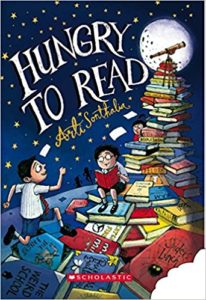 On Sunday 26 November 2017, I moderated the ‘SCHOLASTIC INDIA SESSION’, a conversation on young adult fiction with Shantanu Duttagupta, Scholastic India and Arti Sonthalia at the Times of India LitFest, Delhi (#TLFDelhi). The conversation began with Arti Sonthalia introducing her fabulous chapter book, Hungry to Read. The story revolves around a reading competition in Grade 3 with the aim of inculcating the love of reading amongst the students. The prize of a night stay in school to use the telescope to watch the night sky is what every student dreams of! The delicious way in which Arti makes it more than a dull story about a competition. Read it!
On Sunday 26 November 2017, I moderated the ‘SCHOLASTIC INDIA SESSION’, a conversation on young adult fiction with Shantanu Duttagupta, Scholastic India and Arti Sonthalia at the Times of India LitFest, Delhi (#TLFDelhi). The conversation began with Arti Sonthalia introducing her fabulous chapter book, Hungry to Read. The story revolves around a reading competition in Grade 3 with the aim of inculcating the love of reading amongst the students. The prize of a night stay in school to use the telescope to watch the night sky is what every student dreams of! The delicious way in which Arti makes it more than a dull story about a competition. Read it!
Using Hungry to Read as a springboard, the conversation expanded to reading levels, tools for measuring reading such as lexile and numbers at the back of books, reading for young adults, reading as a lifelong skill particularly in this information age where content is the oil of twenty-first century!
Watch the conversation:
28 November 2017